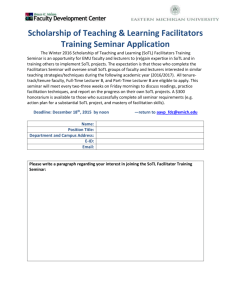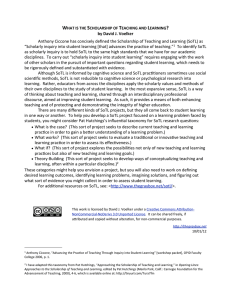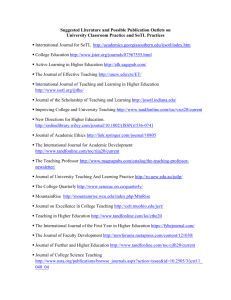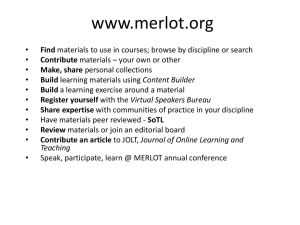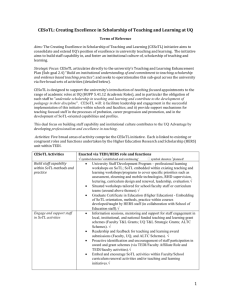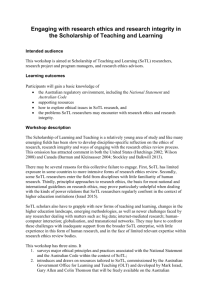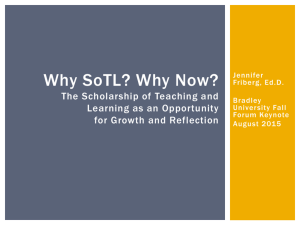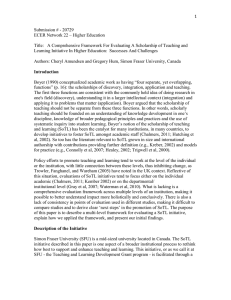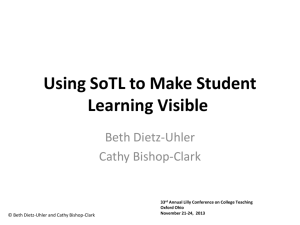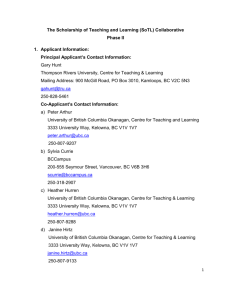Intro to SoTL
advertisement
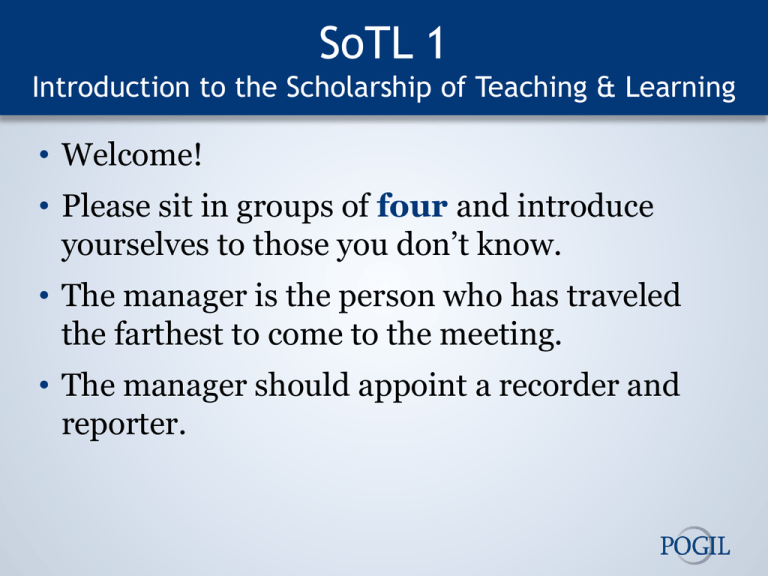
SoTL 1 Introduction to the Scholarship of Teaching & Learning • Welcome! • Please sit in groups of four and introduce yourselves to those you don’t know. • The manager is the person who has traveled the farthest to come to the meeting. • The manager should appoint a recorder and reporter. Workshop Goals During this workshop, each participant will: • Develop a working definition of the scholarship of teaching and learning (SoTL) • Articulate a SoTL question that can be addressed in one’s classroom • Identify the basic components of a SoTL project and resources that can be used to move a project forward Relevant Terminology • Individually, on your index card, define the following (2 min): • Scholarship of Teaching and Learning (SoTL) • Assessment • Evaluation • In your group, compare definitions (4 min). • Be prepared to report on how much agreement or disagreement your group had in the definitions. POGIL’s Working Definitions: SoTL • Various definitions exist in the literature and in practice. • POGIL’s working definition of SoTL: Investigations that begin with the purpose of understanding and improving teaching and learning within a classroom or institution, leading to results that can be shared beyond your classroom. The Ongoing Cycle of Scholarly Teaching & the Scholarship of Teaching and Learning (SoTL) Knowledge Base about Teaching and Reflection on Teaching/Learning Modify Pedagogy Scholarly Teaching Assess Success Scholarship of Teaching Share results Presentation Peer Review Learning Publication Gurung & Schwartz (2009) adapted from Richlin, © 1993 Frameworks for Inquiry Consider the cookies • What kind of questions might you ask about these cookies? • Feel free to Explore the cookies and as a group write one question you might ask about the cookies. Assessment vs. Evaluation • Assessment is analysis and use of data to make improvements in performance. • Evaluation is analysis and use of data to make judgments about performance. http://global.cscc.edu/assessment/AssessEval.shtml Assessment vs. Evaluation: Details Topic Assessment Evaluation Cookies • Establish optimal characteristics • Good cookie • Chewy • Satisfactory cookie • Crunchy • Unsatisfactory cookie • Sweetness level • Composition, etc. Free throw shots • Analyze characteristics of success • Coach to improve characteristics of success • Percentage of successful shots has reached an acceptable level (or not) Assessment vs. Evaluation Writing Assignments Assessment is analysis and use of data to make improvements in performance. Evaluation is analysis and use of data to make judgments about performance. Comments on the first draft allow students to make changes to improve their work. Grade on final draft is overall judgment of quality of written assignment. FORMATIVE SUMMATIVE SoTL Questions • SoTL inquiry into classroom teaching • Focuses on gathering data that can be used to improve • (Formative) Assessment data! • Need to start with a good SoTL question Foci of Assessment Academic Focus Situational Focus • Content Knowledge • Classroom Activity • Process Skills • Classroom Facilitation • Content Unit • Entire Course • Program Curriculum Types of SoTL questions • Idea development ideas • Range of understanding • Long-term learning • Depth of understanding • Measure of critical thinking • Misconceptions • Understanding difficult • Transfer of learning • Progressive dialogue • Instructional practice Savory, P., Burnett, A.N., & Goodburn, A. (2007). Inquiry into the College Classroom: A Journey Toward Scholarly Teaching. Boston, MA: Anker. p. 10 Let’s Get Started What Is Your Question? • Find an issue that is important to you. • My students struggle with graphs • My students don’t seem to get much out of the assigned reading • Write a question you have about it. • What activities help students scaffold their mastery of reading graphs? • What are my students doing when they read the textbook? What Is Your Question? 1. Use the index card to record a question that would be of interest for you to investigate in your classroom (2 min). 2. Categorize your question in at least one of the following ways (1 min). a. Identify its academic focus (content or process skill). b. Identify its situational focus (a single assignment, a content unit, the entire course, etc.) c. Identify what type of inquiry it is (idea development, etc.) Choose a Question To Work on in Your Group In Groups (4 min): • Share your questions. • Select one question in your group to explore in depth. • Write it at the top of your large post-it note. (Leave room for revisions of the question.) Characteristics of a Good Question • Focused. • Specific. • Measurable. • Variables can be identified. Characterizing Questions • Specific: terms mean a particular thing • Focused: scope is one that you can answer within your own teaching context • Measurable: provides a strategy for collecting data • Variables can be identified many (all) of potential influences can be identified. • Is POGIL better than lecture? • Is my implementation of POGIL more effective than my implementation of lecture? • Does my implementation of POGIL result in improved student understanding of how to analyze a graph, compared to my implementation of lecture? • If I add activities which specifically address or utilize the interpretation of graphs, does student understanding improve? Revise your question In Groups (5 min): • Consider how you might refine your question to make it more: • Specific. • Focused. • Measureable. • Variables can be identified. • Recorder: write the revised version of the question on your group’s large post-it. Planning to Collect Data What is Your Investigative Plan? Consider: • Qualitative data (results can differ with observer) • e.g., student responses scored by rubrics, interview data • Quantitative data (constant across observers) • e.g., test scores, percentage of students in particular demographic categories, likert-scale survey data • Both measures are equally valid, but different. Planning to Collect Data What is Your Investigative Plan? Likert scale surveys provide quantitative data from qualitative data. Example: When I read the textbook, I am able to identify and understand the major concepts/ideas in each chapter. a. Strongly agree b. Agree c. Neither agree nor disagree d. Disagree e. Strongly disagree Planning to Collect Data What is Your Investigative Plan? Take two minutes in your group to come up with some types of evidence for each column. Qualitative Quantitative Types of Classroom Data Grades are not the only source of data in a classroom: • Assignments can be designed to help students learn and provide data for classroom investigations. • The use of grading rubrics allows for comparison of student work within or across semesters. Tools for SoTL Data collection Types Where to find them • Surveys • Rubrics • Books on classroom assessment • Interviews • Literature • Achievement questions • Professional societies • Standardized exams • Colleagues in pertinent disciplines • Institutional research office When Thinking About Instruments • Validity: The tool measures what you think it measures. • You don’t measure the temperature with a measuring spoon. • Reliability: The tool will give you consistent answers. • When you set the oven for 400ºF, does it always reach 400ºF? Caveats • Survey questions can be challenging to write • Using a ready-made instrument that was not designed for your purpose might lead to data that are not meaningful or that are misleading. • Modifying an instrument affects its reliability and validity. Data Analysis • Go beyond raw data: • Percentages • Normalization • Graphs • Common themes • Carry out statistical tests: • Are the differences significant? • Effect size Refine Your Investigative Method As a group, come up with a plan to answer your question (8 min). • What measurements will allow you to distinguish among different outcomes? • Match the methodology and tool to the question being asked. • Quantitative/Qualitative/Mixed methods. • Triangulation: Collection of data from different sources to measure a single effect that cannot be measured directly. If you end up revising your question, record the new version on your large post-it. Insights In your group, discuss what insights your group has had regarding the process of designing a SOTL project. Make sure a group member is designated to report out. (4 min) Things To Do To Be Ready for a SoTL Project • Think small/modest (at least at the beginning) • Save everything! • Notes on what you did in class and reflections on how it went • All student work (scan exams, homework, lab notebooks, etc.) • Periodic student feedback or self-assessments • Investigate your institution’s rules on gathering data from/about students. Get IRB (Institutional Research Board) approval, so that any data you collect can be shared beyond your own classroom.
